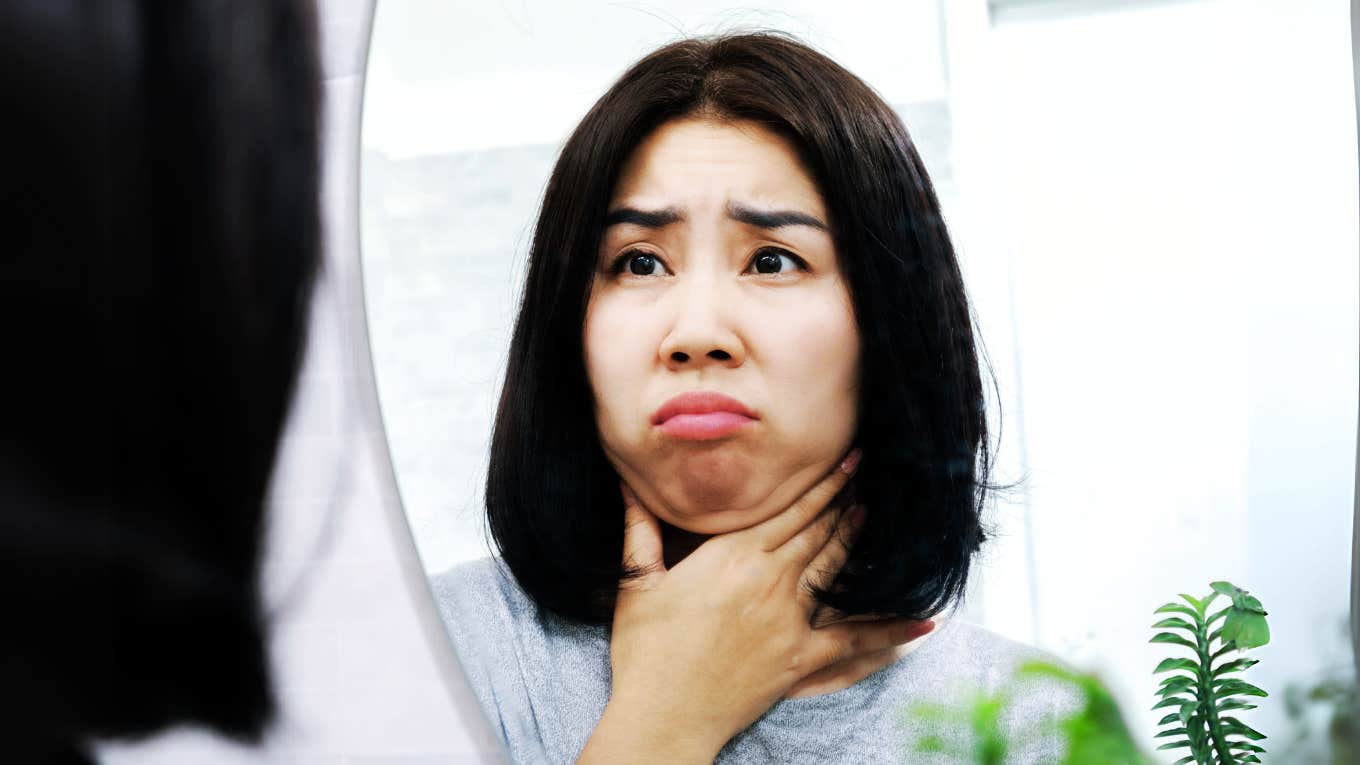Laura Loomer, Stephanie Grisham, And Fat-Shaming — 'Degrading Our Bodies Will Not Silence Our Cause'
When society spews hate at empowered women, we carry on and rise up.
 doucefleur | Canva
doucefleur | Canva I did that thing they warned us not to do. I saw something on social media that angered and hurt me, and I did not ignore it. I did not scroll past it. I did not move on with my life. At least, not immediately.
I thought about it. I fumed. I researched the author of the post. I even complained about it at dinner. Eventually, I decided to write about it.
This post on X — from Laura Loomer, a woman who calls herself an investigative journalist— struck a nerve.
As a successful media personality, she’s amassed 1.2 million followers. She has a large platform, a podcast, and an audience who listens. She recently used her platform to call out Stephanie Grisham, Donald Trump’s former press secretary and communications director. Grisham spoke at the 2024 Democratic National Convention, explaining why she was the first senior staffer to resign on the day of the January 6 U.S. Capitol attack.
Grisham has since condemned Trump’s behaviors and his ability to lead. She has a lot to say, going so far as to write a book about it. In her speech at the convention, she exposed the former president for ridiculing and lying to his supporters:
“He calls them basement dwellers,” she said. “He used to tell me, ‘It doesn’t matter what you say, Stephanie. Say it enough, and people will believe you.’’’
 Alex Green | Pexels
Alex Green | Pexels
Grisham is a woman who recognized her error in judgment. She quit her job because of it. She’s publicly correcting her course, which is no easy task. And Laura Loomer proves that. Instead of responding to Grisham’s speech with something like logic or evidence as to why Trump is her preferred candidate, Loomer's only resort is to attack the former press secretary’s weight. Rather than using her platform to put her political party in a more positive light, Loomer fat-shames Grisham:
Is this “journalist” that full of bitterness and hate? Is she rage-baiting to gain views? Maybe it’s a bit of both. Whatever her motivation, this doesn’t strike me as “investigative journalism.” This is simply an internet personality hitching her career to the wheels of Donald Trump’s campaign. Rather than reporting important information based on facts, she’s contributing to the rampant degradation of women in an attempt to silence them.
Her reaction to an ex-Trump supporter shows no defense for the former president’s actions and behaviors. One has to resort to middle school bullying instead. This is the type of thing the mean kids said to me in middle school — only they targeted my thick glasses and even thicker chest. (My weight issue came later.)
Phyllis Chesler's book, Woman's Inhumanity to Woman, she talks about how women mainly compete against other women and women rely upon other women; women envy and sabotage each other through slander, gossip, and shunning, and women also want other women's approval and support. Once we learn how to think “in opposites,” certain things become clear.
Chesler states that female-female aggression and competition are normal and may, to some extent, be hardwired. In addition, women, like men, have internalized sexist beliefs. Women often have higher and different expectations for other women than we do for men. We tend not to forgive women when they fail us.
We suffer such betrayals and never want to experience such pain again. Paradoxically, but understandably, in terms of economic and social survival, women are more willing to forgive male failure, imperfection, violence, and betrayal—but never such behavior in another woman.
 cottonbro studio | Pexels
cottonbro studio | Pexels
Women who should have matured emotionally since junior high, who are instead hating on other women in support of an unqualified misogynist presidential candidate — this is really and truly not what we, as women, need right now.
My knee-jerk reaction to this politically charged post is out of my control. I immediately think: Of course, she supports Trump. The two have much in common regarding how they manage their public engagement — and how they treat women.
In response to the mean-girl behavior, Grisham acknowledged that she has indeed — gasp! — gained weight. It’s one of a lengthy list of possible side effects when we’re slammed by the metaphorical truck that is menopause.
Hi @LauraLoomer — I’ve hit menopause, which sucks a ton & yes it’s a weight struggle. Def not rich either — I run a non-profit animal sanctuary & could barely afford the blazer I wore tonight. BUT…I told the truth & plan to keep doing so. #RepublicansForHarris
I’ve yet to experience menopause. But it’s one of those inevitable things like taxes or my dog’s naps. For those who can manage the hormonal and metabolic changes without weight gain, that’s an impressive feat. I can’t imagine how difficult it must be to suddenly shift your whole life, putting your time and effort into adjusting your diet and increasing your exercise when what you were doing before was working just fine.
Should a woman have to set aside a career, kids, relationships, and everything just to work on keeping her tight little figure? And what if it isn’t menopause that’s causing a woman to gain weight?
God forbid it’s a human struggle with emotional eating, food addiction, or binge eating disorder. That’s what I’ve been battling for years. My weight issues involve chronic food addiction and the binge eating disorder I can’t seem to kick. I’ve been struggling on and off for decades now, and it’s high time I found a therapist — because I can’t do it on my own.
For someone like me, seeing another woman publicly shamed for her weight is crushing. So many women like myself have experienced cruel words — not to mention violence — aimed at our bodies.
We’re too big. If we’re not too big, we’re too skinny. We’re too ugly or too pretty. Too slutty or too prudish. If we don’t meet society’s subjective criteria of beauty, we’re attacked. And if we do — we’re attacked. It’s an attempt to shut us down. They think that by hurting us with their words, they’re slapping a strip of invisible tape over our mouths.
I used to hurt myself to escape fat shaming. I’ve gained about a hundred pounds. It happened in my early thirties and I’ve yet to lose it, though I’ve been trying for a few years now. A lot of it is the fact that I switched to a desk job. Even more of it has to do with binge eating.
 RF._.studio | Pexels
RF._.studio | Pexels
The point is to stop shaming and judging and being cruel to women — and to people in general.
That’s it. That’s the trick. We all have our stuff. And sometimes, our stuff makes us fat. So what? We should focus on how to achieve a higher level of kindness, understanding, and empathy. We should focus on what makes us feel good and the things that are important to us.
Whether we want to exercise more. eat more or speak out against the people who tear women down for personal gain — we should all follow our happiness. But if you’re someone who finds happiness by knocking down others to muffle your own insecurities, then maybe it’s time to change your course.
When I, an increasingly worn and ragged feminist, heard that Kamala Harris had been nominated for president, I felt hope. It’s our time, I thought. It’s simply our time. A woman president is long overdue.
But it’s so much more than gender. Harris is qualified. She’s the best person for the job, never mind the minor detail of gender. Grisham shares in this line of thinking. And she shouted it to the rooftops when she backed Harris at the DNC.
Our vice president is competent and empathetic. She knows what it’s like to experience life as a woman, and she doesn’t even brag about being able to sexually assault others without consequence.
The criticisms I’ve seen of Harris thus far mainly include jabs about her sexual history. The day after she accepted the nomination, I spotted an image on social media depicting a woman in silhouette, kneeling and giving a man oral sex. The pair of them were forming the “h” in Harris.
Is that the only thing that critics of empowered women have in their arsenal? Can they only fall on the age-old practice of calling women “sluts” and “fat” in an attempt to hurt us, degrade us, and, worst of all, silence us?
Harvard-trained psychologists identified a recurring theme among female patients suffering from depression: a tendency to self-silence, defined as “the propensity to engage in compulsive caretaking, pleasing the other, and inhibition of self-expression in relationships in an attempt to achieve intimacy and meet relational needs.” Researchers found that this learned behavior, strongly rooted in gender norms, was linked to an increased risk of depression.
Their insults are louder and more telling than they know. They can hurt our feelings, yes, but then we see their insecurities showing. I believe that if we continue to call out the degradation of women as we see it — on social media and in real life — we can create enough noise to drown it out.
Holly Paige is a journalist and podcaster who loves to write about relationships, feminism, culture, and mental health. Her work is published on Medium and Substack.
